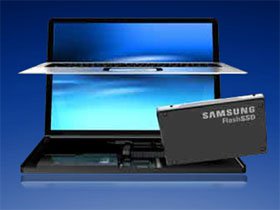There will be super mini SSDs for netbooks
 Source: Gizmodo South Korean electronics giant Samsung has unveiled a new type of solid-state drive (SSD) exclusively for netbooks, with a smaller size and less power consumption than traditional SSDs. .
Source: Gizmodo South Korean electronics giant Samsung has unveiled a new type of solid-state drive (SSD) exclusively for netbooks, with a smaller size and less power consumption than traditional SSDs. .
According to representatives of the company, mini SSD is smaller than SSD for laptops to . 80%. It weighs from 7.5 to 8.5 grams, which is only a tenth of the 75-85 grams weight popular on today's 1.8 and 2.5-inch SSDs.
With such weight and size, mini SSD is perfectly suitable for netbooks, the term refers to ultra-compact, compact laptops with minimal configuration, serving the most basic tasks such as surfing the Net or text editor. Samsung believes the new SSD model can cut weight and extend netbook battery life significantly.
The new SSD can be easily attached to the motherboard without the need for a separate slot, Samsung said. It consumes only about 0.3 watts of electricity, about a quarter of the 1.1-watt of a 2.5-inch SSD.
There is quite a lot of space for manufacturers and users to choose from, but they are all low on average: from 16GB, 32GB and 64GB. For comparison, the popular SSDs on the market today allow up to 256GB of data to be stored.
If PC vendors accept mini SSDs, the first batch of netbooks equipped with this technology will ship in the second half of this year. However, because Samsung has not disclosed the price of mini SSD, the experts have not had any "clues" about the price of netbooks.
Another drawback of mini SSDs is slower read and write speeds than large SSDs. Its read speed only stops at 200M bps (compared to 220M bps) and the write speed is 100M bps (compared to 180M bps).
Due to its small capacity, users can use the mini SSD as a second storage drive, complementing the traditional hard drive. For example, you can save operating system data on SSDs, while hard drives serve photo libraries and important documents. Mini SSDs can also be embedded in devices such as printers.
Slowly, SSDs are gradually penetrating the laptop market, thanks to advantages such as power savings and faster data access than traditional hard drives. However, the price of SSD is very expensive, the capacity is not large, so users still prefer to choose the hard drive.
In most cases, users can't tell the difference between a netbook using a hard drive and an SSD netbook. A hard drive-based netbook has an average battery life of 4 hours, while using SSD, the duration can last an additional half hour.